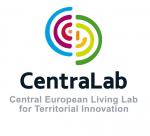Project information
PROJECT TITLE: Central European Living Lab for Territorial Innovation
PROJECT WEB: www.centralivinglab.eu
LEAD PARTNER: E-zavod, Institute for Comprehensive Development Solutions
PROJECT PARTNERS:
- University of Maribor, Faculty of Organizational Sciences / Kranj, Slovenia
- CyberForum e.v. / Karlsruhe, Germany
- University of Vorarlberg / Dornbirn, Austria
- Czech Centre for Science and Society / Prague, Czech Republic
- Informatica Trentina SpA / Trento, Italy
- Corvinno Technology Transfer Centre Nonprofit Public Ltd. / Budapest, Hungary
- Technical University of Košice / Košice, Slovakia
- Piedmont Region / Torino, Italy
- Higher School of Management Konin / Konin, Poland
Project summary
The purpose, goals and activities of CentraLab project are focused on introducing and testing Living lab approach in regional and transnational environment. Living lab approach supports cooperation between business-citizens and government, building on existing territorial capital (people, knowledge, assets). Approach is underlining importance of:
- early engagement of end-users into a co-creation process
- bridging the innovation gap between technology development and the uptake of new products and services
- early assessment of the socio-economic impacts of newly developed technologies
Approach is built on three main axes:
- Examination of existing regional policy framework
- Identifying most appropriate ICT platforms and services tested through PILOT projects
- Development of multi-level governance models for a permanent network structure
In the framework of project activities, 10 partners, coming from 8 European countries, explore potential contributions of open innovation approach on 2 levels:
- On policy level, with an aim to prepare policy recommendations, what could living labs contribute in building regional development policy.
- On implementation level, with 10 pilot LL projects initiatives in 10 policy / thematic fields: energy, eco-tourism, micro-SMEs networks, media and creativity, environment & education, climate change, waste management, rural development, e-health.
To have a common approach and framework for development and implementation of pilots, a common pilot methodology called LEADERS is developed. Methodology has 7 steps, guiding the regional coordinator in building transnational living lab. The purpose of methodology is self and comparative assessment of LL.
Final conference
Final CENTRALAB conference, hosted by 27th Bled eConference, named Ecosystems
In the framework of 27th Bled eConference, titled Ecosystems, which was organized between 1st and 5th of June 2014, we hosted a final project conference of project CentraLab- Central European Living Lab for Territorial Innovation.
Final project conference was dedicated to sharing experience and challenges in the field of open innovation approach, with the purpose of presenting variety of initiatives, projects and business fields where approach can be used. Presenters from Austria, France, Italy and Portugal shared their views about methods of open innovation, social innovation and co-creation in their regions. Program was thematically split in two parts. In the framework of first part speakers presented different experience by using co-designed methods.
Mr Hans-Dieter Zimmermann, presented challenges and potential solutions in the framework of the eSociety Bodensee 2020 Project, focusing on open societal innovation examples. Mr Zimmermann presented how can developed open social innovation solutions contribute to quality of living in the Lake Constance region. In the framework of eSociety Bodensee project 2020, results of TOSIT - The Open Societal Innovation Toolbox was developed which helps involved stakeholders to identify and implement pilot projects in regional society.
Martin Duval presented How to implement Open and Collaborative Innovation? What is open and collaborative innovation? How to use open and collaborative? Why open innovation is useful, characteristics, ICT tools to support open innovation approach, presentation of good practice examples of how to implement open innovation.
Andrea Busato from Scuola Italiana Design -PST Galileo, Italy gave an interesting insight about'SID ROVINJ WORKSHOP': high-powered creative experience for SMEs, which have been implemented 16 years so far, supporting collaboration among CEOs, employees and students of industrial design to find new innovative solutions. Mr Busato stressed the importance of collaboration between different participants and explained that SMEs want to participate because of following reasons: lots of ideas born in short time (1 week), available young creativity (engaging students), deconditioned creativity, creative experience which are not available in office environment.
A presentation from mr Christian Kittl followed demonstrating the use of co-creatinginnovation in a mobile Living Lab. Living lab is organized in the framework of competence center for research and development in the area of mobile communication and innovation, involving research and business partners with the mission of enabling mobile innovation. Main areas of research are:
- Mobile Processes (Mobile Payment, Mobile CRM),
- Mobile Social Media & User Interaction,
- Media convergence (Internet of Things, Augmented Reality),
- Living Lab and Open Innovation.
To involve stakeholders following tools developed and tested: web platform, mobile applications enabling stakeholders to upload their ideas, diaries, chats, sketches, responses.
Last presentation of the first part included presentation of the UPSIDE project (User-driven Participatory Solutions for Innovation in Digitally-centred Ecosystems) given by Dr. Ralf Trunko. Dr Trunko emphasized that project is focused on delivering economic and societal benefits by fostering the emergence and development of user-driven participatory solutions in identifying innovation. Project is implemented by 5 clusters which will test innovative solutions in the framework of pilot projects (test beds) in following fields: health, mobility, public services and energy.
Part two of the final conference was dedicated to policy issues related to innovation. 3 speakers mr Jesse Marsh, mr Christian Kittl and mr Álvaro de Oliveira presented and comment how innovation activities are positioned in programmes of territorial innovation, Danube Region Strategy and how can innovation policy be integrated between Horizon 2020 Programme and Regional Innovation Policy. Their presentations open a discussion about variety of issues burdening modern society and way of living and gave a good closure what could be future innovation challenges.
Prepared by Anja Prislan, E-zavod




